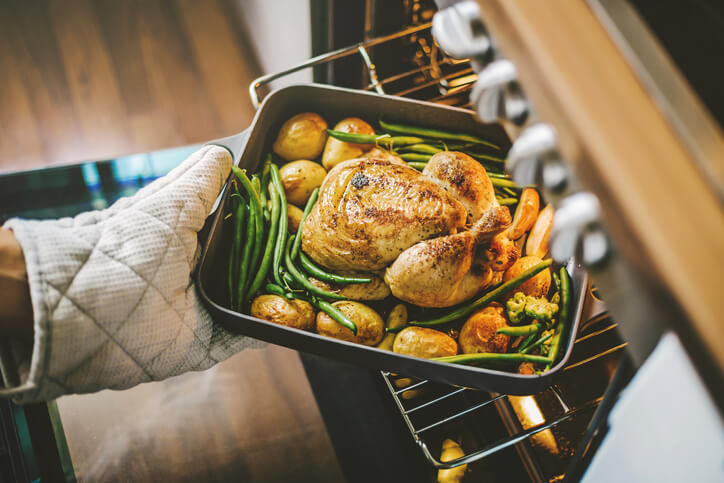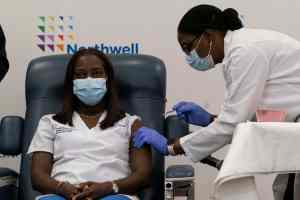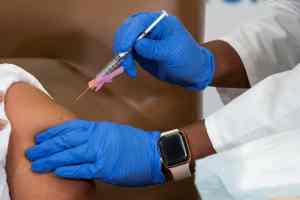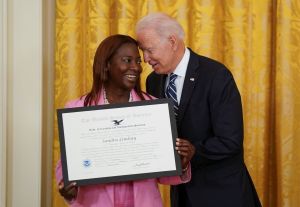7 Tips for a Safe and Healthy Thanksgiving
So you have your Thanksgiving checklist: Deep-fried turkey and all the fixings on the menu. House decorated and packed with loved ones in the kitchen. Touch football in the backyard and New York Giants on the TV. With vaccines widely available to everyone over six months old and travel restrictions long gone, you may be doing Thanksgiving like it’s 2019. But now more than ever, you need to add a safety checklist to your holiday planning.
A return to normalcy also means a return to hazards, like burns from handling those flimsy aluminum trays that collapse and spill hot food. In scenarios like that, people often push care off until the next day because they’re enjoying their family time. A few years ago, I treated a patient with a grapefruit-sized blister because she waited until the day after Thanksgiving to seek burn care.
As associate medical director at Northwell Health-GoHealth Urgent Care, I see a wide range of holiday-related accidents and injuries. Here are some important safety reminders that can help ensure your Thanksgiving is full of happy memories:

- Caring for cooking burns: The Thanksgiving kitchen is full of opportunities to scald yourself. So how do you assess and treat a burn? First, run the burned area under lukewarm or cool water (not icy cold, as this can cause more damage) for 10 to 15 minutes and then check the burn for size and color. Most cooking-related burns can be treated with soothing creams like aloe and over-the-counter pain medications, such as ibuprofen. But immediate medical care should be sought for burns larger than 1-2 inches, those in a really sensitive area, or charred skin that’s white, brown, leathery or shiny.
- Prevent food poisoning: You may know about salmonella, but have you heard of Clostridium perfingens? It’s the so-called “buffet germ” that grows fastest in large portions like casseroles, gravies and any food sitting at room temperature. Both types of bacteria will give you tummy trouble. Never wash your bird. Cook your turkey and stuffing to at least 165⁰ F, and keep food at 140⁰ or warmer or 40⁰ or cooler if it’s not being eaten right away. Consider making your stuffing outside the bird for an even safer option. If you suspect food poisoning, drink lots of fluids, including electrolytes.
- Know your knife safety protocols: Thanksgiving brings out the chef in everyone, but some people at the counter may not have proper knife skills. With more than 1/3 of knife-related injuries happening in the kitchen, you can protect your fingers by making sure you have sharp knives, as dull blades require more pressure to cut. Curl your fingers and cut away from your body when trimming or deboning. Keep your knives off counters and out of sinks by washing and storing them immediately.
- Practice safe hygiene: Whether you’re trying to prevent food poisoning or the flu, the number one hygiene recommendation is to wash your hands. The rules always bear repeating: wash your hands with soap and water for at least 20 seconds before and after touching your eyes, nose or mouth, prepping food, eating a meal and using the restroom.
- Sick-season protocols: Fall and winter are peak cold-flu-COVID season, so consider establishing new protocols for guests like checking vaccine statuses. You can also request guests to take rapid COVID-19 tests in advance of attendance. If your group has any high-risk individuals, you can consider even more rigorous testing protocols like PCR tests available at Northwell Health-GoHealth Urgent Care centers. Ask guests to screen themselves for any cold, flu or COVID symptoms and stay home for even mild symptoms.
- Prep before you play: For people ages 25 and older, Thanksgiving is the peak day for football injuries. From pulled muscles and sprained ankles to broken bones, ERs see an uptick in people who have taken on the vigorous sport without a lot of prep and often inebriated. The best defenses are to exercise regularly throughout year, avoid alcohol before the game and stretch and warm up your body before and after engaging in intense play. Strains and sprains are the types of injuries better seen at Northwell Health-GoHealth Urgent Care than at your ER.
- Limit alcohol intake: Every single Thanksgiving-related injury or hazard is exacerbated by alcohol. Consider this: DUI offenders being monitored for alcohol consumption increase their intake by 33% between Thanksgiving and New Year’s Day. Alcohol consumption dampens your abilities to properly manage everything from kitchen knives and turkey fryers to your vehicle. Consider including mocktails, sparkling waters and other alcohol-free options as part of your celebrations.
Add these tips to your holiday planning checklist, and you’ll be sure to have a holiday that you can be thankful for. If a mishap does happen, don’t hesitate to schedule an appointment at one of Northwell Health-GoHealth Urgent Care’s 55 urgent care centers across New York. Visit gohealthuc.com/northwell for more information. And go Giants!



























